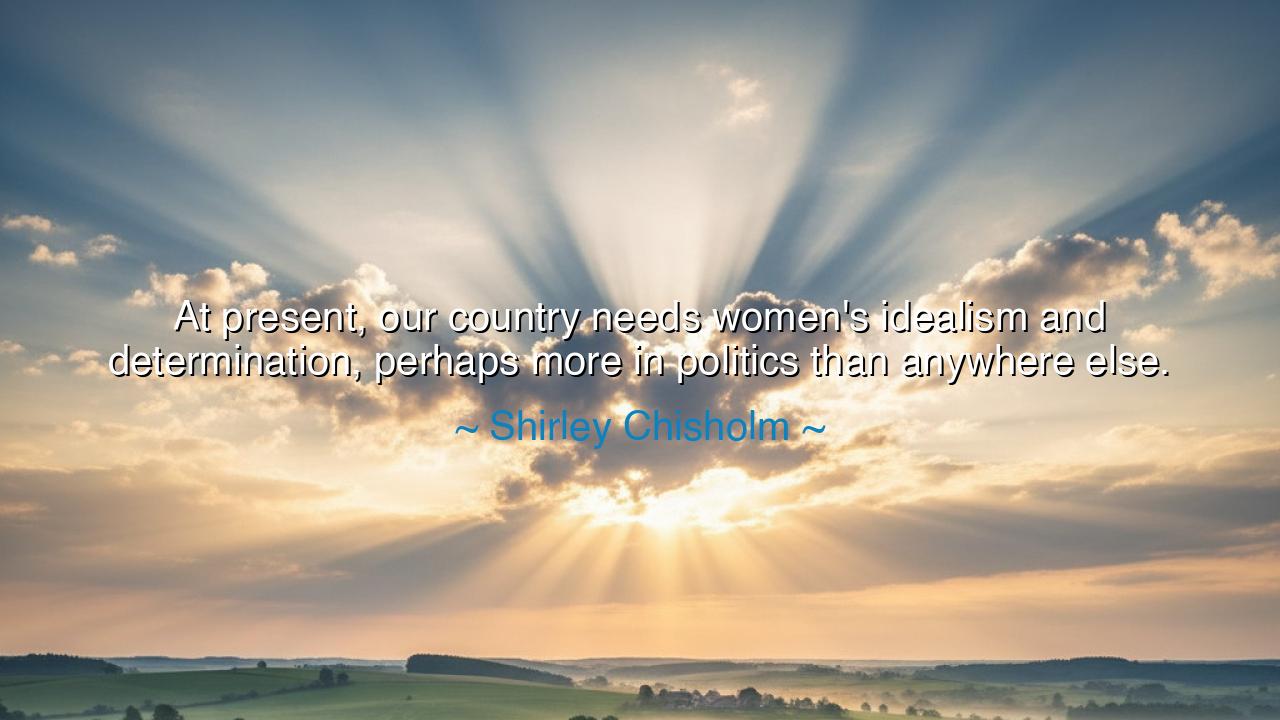
At present, our country needs women's idealism and
At present, our country needs women's idealism and determination, perhaps more in politics than anywhere else.






The words of Shirley Chisholm, the first Black woman elected to the United States Congress, are both a trumpet and a prayer: “At present, our country needs women’s idealism and determination, perhaps more in politics than anywhere else.” With this saying, she summons forth the power of women, not as a gentle ornament to the public sphere, but as a force of renewal, courage, and vision. She declares that the survival of the nation demands not only laws and armies, but the infusion of idealism and determination—qualities that women have long carried through centuries of endurance.
The ancients knew that when a people falter, new strength must be sought. In the myths of Athena, goddess of wisdom and strategy, we see how the feminine spirit was revered as the source of clarity in times of chaos. Chisholm takes this eternal truth and plants it in her own age: that when politics grows stagnant or corrupted, it is the voice of women, long silenced, that can restore vigor and principle. For politics, if it serves only ambition and not ideals, becomes a hollow shell.
Consider the life of Chisholm herself. When she entered Congress in 1968, she did so not as one invited, but as one who seized her place. Known as “Unbought and Unbossed,” she refused to bow to party machines or the expectations of men. She fought for education, for the poor, for women, for minorities, carrying with her the very determination she spoke of. And when she ran for President in 1972, though victory eluded her, her courage shattered barriers and carved a path for generations to follow.
Her words also rebuke the notion that women’s gifts belong only in the home. She proclaims that the nation itself is a kind of household, and that without women’s insight, compassion, and resilience, its governance falters. Just as mothers, sisters, and daughters have held families together in times of hardship, so too must their strength hold the republic together in its trials. Their idealism is not naïve—it is the vision that lifts politics above selfish quarrel, and their determination is the steel that ensures progress is not abandoned.
Let the generations remember: the renewal of nations comes when all voices are heard, and when the strength of women is not kept at the margins but placed at the center. Shirley Chisholm speaks as both prophet and pioneer, reminding us that the fate of the people rests not only on the shoulders of men, but equally on the unyielding resolve of women. For when women rise in politics, they bring with them not only themselves, but the promise of justice, compassion, and unbreakable hope.






T840.Ngoc Thanh 8a1
Shirley Chisholm’s quote speaks to the vital need for idealism and determination in politics, qualities often attributed to women. I wonder, though—do these qualities always lead to positive change, or can they be naive or overly idealistic? While they can bring fresh perspectives, are they enough to navigate the complexities of real-world politics? It’s important to consider how these traits balance with the pragmatic aspects of governance and leadership.
MNMinh Nguyen
Chisholm’s belief that women’s idealism and determination are needed in politics is spot-on, but I wonder—why do we often see these qualities as uniquely feminine? Shouldn’t these traits be essential for everyone in politics, regardless of gender? Perhaps it’s time for a new kind of politics where idealism and determination are the foundation for all leaders, not just one gender. What might our political landscape look like if that were the case?
HPHuong Pham
Chisholm’s statement really resonates with me, especially in a world where politics often feels disillusioned and transactional. There is something powerful about the combination of idealism and determination that women bring to the political sphere. But could this focus on women’s qualities in politics be inadvertently placing a heavier burden on them to ‘save’ the system? Should we focus more on transforming the political system as a whole rather than expecting women to bring all the change?
TTHo Phan Thanh Thao
I find Chisholm’s comment inspiring because it acknowledges the vital role women can play in shaping the political landscape. In a time when politics often seems cynical and divided, the qualities of idealism and determination could be the antidote. But I’m curious—what does it mean for politics to embrace these qualities? Should women be expected to lead with idealism, or should we expect these qualities from everyone, regardless of gender?
KDNguyen Khanh Diep
Shirley Chisholm’s quote highlights the importance of women's influence in politics, especially at a time when change is desperately needed. Her belief in women’s idealism and determination is empowering, but I wonder—why is this energy often seen as something that only women can offer? Could it be that society underestimates the idealism and determination of men, or is it simply a matter of highlighting the unique perspectives women bring to the table?